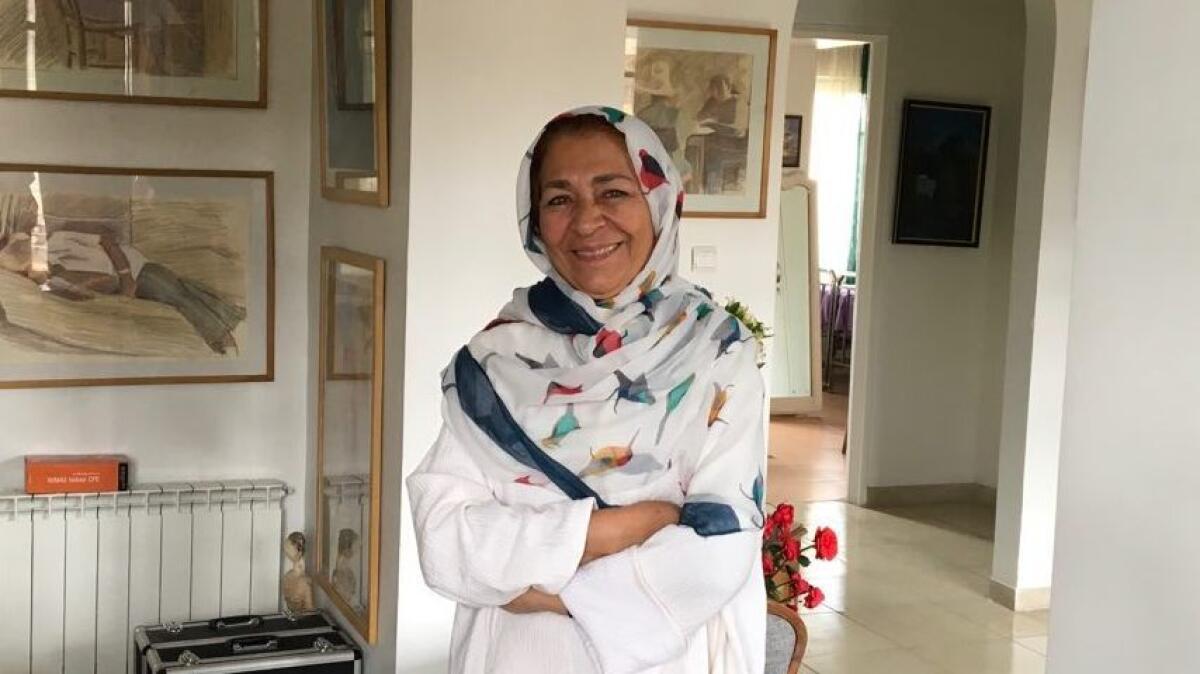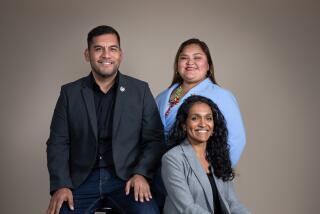Pedestrian walkways, bike lanes, green spaces: An unusual election platform for a politician in Iran

Reporting from Tehran — The cellphone rang, filling the salon of the cozy walk-up apartment with the sound of classical music that reverberated off the cream-colored walls lined with landscape paintings and contemporary sketches.
Taraneh Yalda, a 62-year-old architect, answered the call. It was a colleague inviting her to his gallery in Tehran, but they had more than art and design to discuss.
For the record:
7:45 p.m. May 9, 2017An earlier version of this article said that Taraneh Yalda earned her doctorate in Turin, Italy, in 1954. She received the degree in 1978.
Last month, in a surprise, Yalda won the approval of Iran’s conservative election monitors to run for a seat on Tehran’s City Council. Hailing from a family of artists and musicians, and educated in Italy and France, Yalda is one of a handful of progressive candidates in a field of more than 2,700 vying for 21 places on the council.
The municipal election takes place May 19, the same day as the presidential contest in which incumbent Hassan Rouhani, a relative moderate, is seeking a second four-year term. While most of Iran is fixated on the presidential vote, Yalda’s candidacy has won attention from the capital’s urbane, educated set.
This city is a tremendous, sprawling monster. ... I want to humanize the character of the city.
— Taraneh Yalda
Since the 1979 Islamic Revolution, Yalda’s supporters say, Tehran has never had a prominent architect or city planner serve on the City Council. The current council has attempted to enforce gender segregation laws by separating men’s and women’s offices in municipal buildings, and morality police occasionally patrol the streets to limit intermingling of the sexes in public spaces.
Yalda opposes such steps. Warm and grandmotherly, with henna-dyed hair under a patterned headscarf, she speaks of making Tehran, whose gray air and gridlocked freeways are reminiscent of 1970s Los Angeles, a more “humane” city.
Like an Iranian Jane Jacobs — the American writer who fought to save New York’s Greenwich Village from developers in the 1960s — she supports revitalizing Tehran’s old neighborhoods by creating bicycle lanes and pedestrian-friendly zones so that residents, particularly women, can walk more safely.
“This city is a tremendous, sprawling monster,” she told her artist friend. “It is imposing itself on the minds and hearts of its inhabitants. I want to humanize the character of the city.”
Urban planning is not a forte in much of the Middle East, where cities grow haphazardly and roads and concrete towers spring more often from bribery and corruption than any master plan. In a televised presidential debate in April, Rouhani accused Tehran’s mayor, Mohammad Bagher Qalibaf, of allowing high-rises to proliferate unchecked, destroying the small gardens that once dotted the city of 9 million.
Asked how she would battle Tehran’s “construction mafia,” Yalda invoked an example from Italy, where she earned a doctorate in architecture from Polytechnic University of Turin in 1978.
“I won’t fight directly with any group with vested interests, but I would try to convince the mafia to change the way the Mafia in Palermo, Sicily, was changed starting in 1992,” the year that popular opposition to the violent crime bosses began to turn the tide against the Italian Mafia.
She went on to study in Paris, where she learned how a city can have “its own rights and personality.” She was living in France when the Islamic Revolution toppled Iran’s Western-backed shah, and she rushed back to her country, hoping to witness the start of a more equitable and populist regime.
“Things went differently from what we wished,” she said, sipping tea from an elegant white cup. “We struggled, but we are not disheartened.”
While Iran’s ruling mullahs have largely marginalized secular intellectuals, Yalda maintains an active professional life, designing private homes for the well -heeled and advising planners in Tehran and other cities.
She has translated scores of works on urbanization, including “Invisible Cities,” a 1972 novel by the Italian writer Italo Calvino that imagines the travels of the explorer Marco Polo — and that sits on a table in her living room. She also writes columns in newspapers published by Iranian reformists, who oppose the theocracy, agitate for greater social freedoms and generally back Rouhani for reelection.
Many believe that Yalda’s election hopes rest with being formally endorsed by reformist politicians and named to their slate of 21 City Council candidates. With more than 700 reformist candidates, however, her selection is far from assured.
“If the reformists want me and put me on their list, I would appreciate that,” she said. “If not, it is their loss. I am a ‘doctor of cities’ and I know how to cure a sick city.”
She had never run for office before, but in March, a friend of her son, who is studying in the United States, got in touch to wish her a happy Persian New Year. The friend, editor of an architectural weekly, said she should run and “fight for your beloved city.”
“Oh, my God, that’s a good idea,” Yalda recalled saying.
The election monitoring board, made up of members of the Iranian parliament, allowed several former political prisoners and civil society activists to run for city council. To reformists and moderates, it was a sign of their increasing political power since February 2016, when they swept all 30 parliamentary seats in Tehran in what was a strong vote of confidence for Rouhani.
Yalda was surrounded at her home on a recent afternoon by a gaggle of supporters — artists, architects, painters, theater and cinema actors and volunteers. Her fans have launched a channel on Telegram, a popular messaging app, called “Taraneh of Tehran”; taraneh is Persian for “song.”
Asked what she would do if she lost, Yalda shrugged.
“It is my daily routine to write about my darling, patient city, so I will keep that up,” she said. “But at least I will fight for the sake of my city during my campaign.”
ALSO
Here’s one country where hard-liners might not be poised for election success: Iran
Iran is quiet, for now, in the face of fresh threats from the Trump administration
Iran convicted two U.S. citizens of espionage. Their relatives are pressing Trump for help
Special correspondent Mostaghim reported from Tehran and Times staff writer Bengali from Mumbai, India.
Follow @SBengali on Twitter for more news from South Asia
More to Read
Sign up for Essential California
The most important California stories and recommendations in your inbox every morning.
You may occasionally receive promotional content from the Los Angeles Times.











